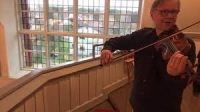Violin Sheet Music
 "... Ritchie Blackmore was a huge early influence on me, but after that I had to find my own way ... Johann Sebastian Bach was probably the most influential guy ever on me ... Vivaldi, Beethoven and eventually Paganini ... all of a sudden I was thinking in all these other areas, instead of blues riffs ..." Yngwie Malmsteen
"... Ritchie Blackmore was a huge early influence on me, but after that I had to find my own way ... Johann Sebastian Bach was probably the most influential guy ever on me ... Vivaldi, Beethoven and eventually Paganini ... all of a sudden I was thinking in all these other areas, instead of blues riffs ..." Yngwie Malmsteen
Bach

Johann Sebastian Bach (31 March 1685 – 28 July 1750) was a German composer and organist whose sacred and secular works for choir, orchestra, and solo instruments drew together the strands of the Baroque period and brought it to its ultimate maturity. Although he introduced no new forms, he enriched the prevailing German style with a robust contrapuntal technique, an unrivalled control of harmonic and motivic organisation in composition for diverse musical forces, and the adaptation of rhythms and textures from abroad, particularly Italy and France.
Revered for their intellectual depth and technical and artistic beauty, Bach's works include the Brandenburg concertos; the Goldberg Variations; the English Suites, French Suites, Partitas, and Well-Tempered Clavier; the Mass in B Minor; the St. Matthew Passion; the St. John Passion; The Musical Offering; The Art of Fugue; the Sonatas and Partitas for violin solo; the Cello Suites; more than 200 surviving cantatas; and a similar number of organ works, including the celebrated Toccata and Fugue in D Minor.
While Bach's fame as an organist was great during his lifetime, he was not particularly well-known as a composer. His adherence to Baroque forms and contrapuntal style was considered "old-fashioned" by his contemporaries, especially late in his career when the musical fashion tended towards Rococo and later Classical styles. A revival of interest and performances of his music began early in the 19th century, and he is now widely considered to be one of the greatest composers in the Western tradition.
Revered for their intellectual depth and technical and artistic beauty, Bach's works include the Brandenburg concertos; the Goldberg Variations; the English Suites, French Suites, Partitas, and Well-Tempered Clavier; the Mass in B Minor; the St. Matthew Passion; the St. John Passion; The Musical Offering; The Art of Fugue; the Sonatas and Partitas for violin solo; the Cello Suites; more than 200 surviving cantatas; and a similar number of organ works, including the celebrated Toccata and Fugue in D Minor.
While Bach's fame as an organist was great during his lifetime, he was not particularly well-known as a composer. His adherence to Baroque forms and contrapuntal style was considered "old-fashioned" by his contemporaries, especially late in his career when the musical fashion tended towards Rococo and later Classical styles. A revival of interest and performances of his music began early in the 19th century, and he is now widely considered to be one of the greatest composers in the Western tradition.
Georges Bizet

Georges Bizet (25 October 1838 – 3 June 1875) was a French composer and pianist of the Romantic era. He is best known for the opera Carmen.
Bizet was born at 26 rue de la Tour d'Auvergne in the 9th arrondissement of Paris in 1838. He was registered with the legal name Alexandre César Léopold Bizet, but he was baptised on 16 March 1840 with the first name Georges, and he was always known thereafter as Georges Bizet. His father Adolphe Armand Bizet (1810-86) was an amateur singer and composer, and his mother, Aimée Léopoldine Joséphine née Delsarte (1814-61), was the sister of the famous singing teacher François Delsarte.
He entered the Paris Conservatory of Music on 9 October 1848, a fortnight before his tenth birthday. His teachers there were Pierre Zimmermann (fugue and counterpoint; often assisted by his son-in-law Charles Gounod), Antoine François Marmontel (piano), François Benoist (organ) and, on Zimmermann's death, Fromental Halévy, whose daughter he himself later married. He won first prizes for organ and fugue in 1855 and completed his earliest compositions.
His first symphony, the Symphony in C, was written in November 1855, when he was seventeen, evidently as a student assignment. It was unknown to the world until 1933, when it was discovered in the archives of the Paris Conservatory library. Upon its first performance in 1935, it was immediately hailed as a junior masterwork and a welcome addition to the early Romantic period repertoire. The symphony bears a stylistic resemblance to the first symphony of Gounod, first played earlier in the same year, and which Bizet had arranged for two pianos although present-day listeners may discern a similarity to music of Franz Schubert, whose work was little known in France at the time the symphony was written.
In 1857, a setting of the one-act operetta Le docteur Miracle won him a share in a prize offered by Jacques Offenbach. He also won the music composition scholarship of the Prix de Rome, the conditions of which required him to study in Rome for three years. There, his talent developed as he wrote such works as the opera buffa Don Procopio (1858-59). There he also composed his only major sacred work, Te Deum (1858), which he submitted to the Prix Rodrigues competition, a contest for Prix de Rome winners only. Bizet failed to win the Prix Rodrigues, and the Te Deum score remained unpublished until 1971. He made two attempts to write another symphony in 1859, but destroyed the manuscripts in December of that year. Apart from this period in Rome, Bizet lived in the Paris area all his life.
Shortly after leaving Rome in July 1860, but while still touring in Italy, he had the idea of writing a symphony in which each of the four movements would be a musical evocation of a different Italian city – Rome, Venice, Florence and Naples. On hearing of his mother's serious illness he cut short his Italian travels and returned to Paris in September 1860; she died a year later. The Scherzo of the symphony was completed by November 1861, but it was not until 1866 that the first version of the whole symphony was written. He subjected it to a number of revisions through to 1871, but died before ever producing what he considered the definitive version. For this reason, the work is sometimes described as "unfinished", but this is an inaccurate description as it was fully scored. It was published in 1880 as the Roma Symphony.
Bizet was born at 26 rue de la Tour d'Auvergne in the 9th arrondissement of Paris in 1838. He was registered with the legal name Alexandre César Léopold Bizet, but he was baptised on 16 March 1840 with the first name Georges, and he was always known thereafter as Georges Bizet. His father Adolphe Armand Bizet (1810-86) was an amateur singer and composer, and his mother, Aimée Léopoldine Joséphine née Delsarte (1814-61), was the sister of the famous singing teacher François Delsarte.
He entered the Paris Conservatory of Music on 9 October 1848, a fortnight before his tenth birthday. His teachers there were Pierre Zimmermann (fugue and counterpoint; often assisted by his son-in-law Charles Gounod), Antoine François Marmontel (piano), François Benoist (organ) and, on Zimmermann's death, Fromental Halévy, whose daughter he himself later married. He won first prizes for organ and fugue in 1855 and completed his earliest compositions.
His first symphony, the Symphony in C, was written in November 1855, when he was seventeen, evidently as a student assignment. It was unknown to the world until 1933, when it was discovered in the archives of the Paris Conservatory library. Upon its first performance in 1935, it was immediately hailed as a junior masterwork and a welcome addition to the early Romantic period repertoire. The symphony bears a stylistic resemblance to the first symphony of Gounod, first played earlier in the same year, and which Bizet had arranged for two pianos although present-day listeners may discern a similarity to music of Franz Schubert, whose work was little known in France at the time the symphony was written.
In 1857, a setting of the one-act operetta Le docteur Miracle won him a share in a prize offered by Jacques Offenbach. He also won the music composition scholarship of the Prix de Rome, the conditions of which required him to study in Rome for three years. There, his talent developed as he wrote such works as the opera buffa Don Procopio (1858-59). There he also composed his only major sacred work, Te Deum (1858), which he submitted to the Prix Rodrigues competition, a contest for Prix de Rome winners only. Bizet failed to win the Prix Rodrigues, and the Te Deum score remained unpublished until 1971. He made two attempts to write another symphony in 1859, but destroyed the manuscripts in December of that year. Apart from this period in Rome, Bizet lived in the Paris area all his life.
Shortly after leaving Rome in July 1860, but while still touring in Italy, he had the idea of writing a symphony in which each of the four movements would be a musical evocation of a different Italian city – Rome, Venice, Florence and Naples. On hearing of his mother's serious illness he cut short his Italian travels and returned to Paris in September 1860; she died a year later. The Scherzo of the symphony was completed by November 1861, but it was not until 1866 that the first version of the whole symphony was written. He subjected it to a number of revisions through to 1871, but died before ever producing what he considered the definitive version. For this reason, the work is sometimes described as "unfinished", but this is an inaccurate description as it was fully scored. It was published in 1880 as the Roma Symphony.
Carl Reinecke
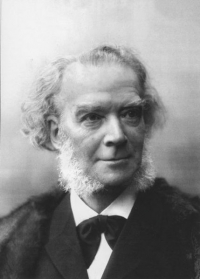
Carl Heinrich Carsten Reinecke (June 23, 1824 – March 10, 1910) was a German composer, conductor, and pianist.
Reinecke is best known for his flute sonata "Undine", but he is also remembered as one of the most influential and versatile musicians of his time. He served as a teacher for 35 years, until 1902. His students included Edvard Grieg, Basil Harwood, Christian Sinding, Leoš Janáček, Isaac Albéniz, Johan Svendsen, Richard Franck, Felix Weingartner, Max Bruch, and Felix Fox among many others.
Reinecke is best known for his flute sonata "Undine", but he is also remembered as one of the most influential and versatile musicians of his time. He served as a teacher for 35 years, until 1902. His students included Edvard Grieg, Basil Harwood, Christian Sinding, Leoš Janáček, Isaac Albéniz, Johan Svendsen, Richard Franck, Felix Weingartner, Max Bruch, and Felix Fox among many others.
Marin Marais
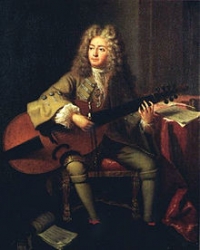
Marin Marais (31 May 1656, Paris – 15 August 1728, Paris) was a French composer and viol player. He studied composition with Jean-Baptiste Lully, often conducting his operas, and with master of the bass viol Monsieur de Sainte-Colombe for 6 months. He was hired as a musician in 1676 to the royal court of Versailles. He did quite well as court musician, and in 1679 was appointed "ordinaire de la chambre du roy pour la viole", a title he kept until 1725.
He was a master of the basse de viol, and the leading French composer of music for the instrument. He wrote five books of Pièces de viole (1686-1725) for the instrument, generally suites with basso continuo. These were quite popular in the court, and for these he was remembered in later years as he who "founded and firmly established the empire of the viol" (Hubert Le Blanc, 1740). His other works include a book of Pièces en trio (1692) and four operas (1693-1709), Alcyone (1706) being noted for its tempest scene.
He was a master of the basse de viol, and the leading French composer of music for the instrument. He wrote five books of Pièces de viole (1686-1725) for the instrument, generally suites with basso continuo. These were quite popular in the court, and for these he was remembered in later years as he who "founded and firmly established the empire of the viol" (Hubert Le Blanc, 1740). His other works include a book of Pièces en trio (1692) and four operas (1693-1709), Alcyone (1706) being noted for its tempest scene.
Traditional

traditional music
Enya
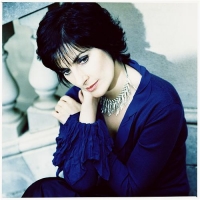
Enya (born Eithne Patricia Nà Bhraonáinon May 17, 1961, Gaoth Dobhair, County Donegal, Ireland), sometimes presented in the media as Enya Brennan, is an Irish singer, instrumentalist and composer. She is Ireland's best-selling solo artist and is officially the country's second biggest musical export (after U2). Her works have earned her four Grammy Awards and an Academy Award nomination, and she is also famous for performing in 10 different languages during her lengthy career. Enya is an approximate transcription of how Eithne is pronounced in her native Irish, in the Donegal dialect.
Heinrich Wilhelm Ernst
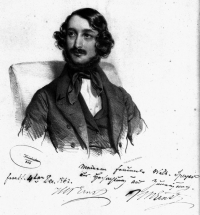
Heinrich Wilhelm Ernst (8 June 1812 – 8 October 1865) was a Moravian-Jewish violinist, violist and composer. He was widely seen as the outstanding violinist of his time and one of Niccolò Paganini's greatest successors.He was a highly esteemed artist in his day. Many saw him as the superior violinist of his time and Paganini's greatest successor. Not only did he contribute to polyphonic playing, but he also discovered new idiomatic ways to compose polyphonically conceived violin music. His friends included Hector Berlioz and Felix Mendelssohn.
Niels Gade
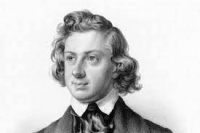
Niels Wilhelm Gade (22 February 1817 – 21 December 1890) was a Danish composer, conductor, violinist, organist and teacher. He is considered the most important Danish musician of his day.[1Gade was born in Copenhagen, the son of a joiner and instrument maker. He began his career as a violinist with the Royal Danish Orchestra, which premiered his concert overture Efterklange af Ossian ("Echoes of Ossian") in 1841. When his first symphony was turned down for performance in Copenhagen, he sent it to Felix Mendelssohn.
Leos Janacek
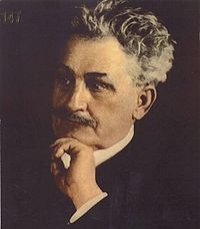
Leoš Janáček (Czech pronunciation: ( listen)) (baptised Leo Eugen Janáček) (July 3, 1854 – August 12, 1928), was a Czech composer, musical theorist, folklorist, publicist and teacher. He was inspired by Moravian and all Slavic folk music to create an original, modern musical style. Until 1895 he devoted himself mainly to folkloristic research and his early musical output was influenced by contemporaries such as Antonín Dvořák. His later, mature works incorporate his earlier studies of national folk music in a modern, highly original synthesis, first evident in the opera Jenůfa, which was premiered in 1904 in Brno. The success of Jenůfa (often called the "Moravian national opera") at Prague in 1916 gave Janáček access to the world's great opera stages. Janáček's later works are his most celebrated. They include the symphonic poem Sinfonietta, the oratorial Glagolitic Mass, the rhapsody Taras Bulba, string quartets, other chamber works and operas. He is considered to rank with Antonín Dvořák and Bedřich Smetana, as one of the most important Czech composers.
Richard Strauss
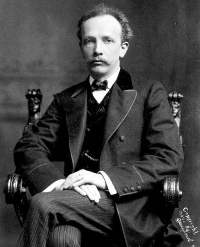
Richard Georg Strauss (German pronunciation: ; 11 June 1864 – 8 September 1949) was a German composer, conductor, pianist, and violinist. Considered a leading composer of the late Romantic and early modern eras, he has been described as a successor of Richard Wagner and Franz Liszt. Along with Gustav Mahler, he represents the late flowering of German Romanticism after Wagner, in which pioneering subtleties of orchestration are combined with an advanced harmonic style.
Arvo Pärt
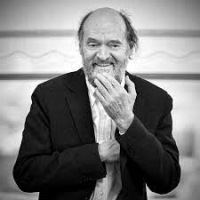
Arvo Pärt is an Estonian composer of classical and religious music. Since the late 1970s, Pärt has worked in a minimalist style that employs his self-invented compositional technique, tintinnabuli. Pärt's music is in part inspired by Gregorian chant.
Francisco Manoel da Silva
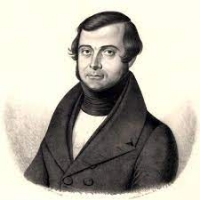
Francisco Manuel da Silva was a Brazilian songwriter and music professor. He was born and died in Rio de Janeiro. He had great prominence in the musical life of Rio de Janeiro in the period between the death of José Maurício Nunes Garcia and Antônio Carlos Gomes.
Pablo de Sarasate

Pablo Martín Melitón de Sarasate y Navascués (10 March 1844 – 20 September 1908) was a Spanish violinist and composer of the Romantic period.
Stella Quintet
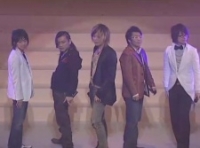
Stella Quintet Musical group stella quintet (ステラ・クインテット), also known as stella quintet+, is a fictional J-pop / classical five piece band featured in the anime Kin'iro no Corda ~Primo Passo~.
Brian Ferneyhough
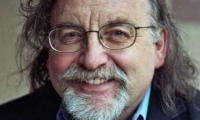
Brian John Peter Ferneyhough (/ˈfɜːrnihoʊ/; born 16 January 1943) is an English composer.Ferneyhough is typically considered to be the central figure of the New Complexity movement. Ferneyhough has taught composition at the Hochschule für Musik Freiburg and the University of California, San Diego; he teaches at Stanford University and is a regular lecturer in the summer courses at Darmstädter Ferienkurse.He has resided in California since 1987.
Henry Clay Work
Henry Clay Work (October 1, 1832 – June 8, 1884) was an American composer and songwriter known for the songs Kingdom Coming, Marching Through Georgia, Wreck of the Old 97 and My Grandfather's Clock.Work produced much of his best material during the Civil War. He captured the deeply-felt emotions of that conflict and was more popular even than Stephen Foster. Work shares much of the credit for the development of the carefully refined Verse-Chorus structure of late 19th century popular song.
Irving Berlin

Irving Berlin (May 11, 1888 – September 22, 1989) was a Russian-born American composer and lyricist, and one of the most prolific American songwriters in history. Berlin was one of the few Tin Pan Alley/Broadway songwriters who wrote both lyrics and music for his songs. Although he never learned to read music beyond a rudimentary level, with the help of various uncredited musical assistants or collaborators, he eventually composed over 3,000 songs, many of which (e.g. "God Bless America", "White Christmas", "Anything You Can Do", "There's No Business Like Show Business") left an indelible mark on music and culture worldwide. He composed seventeen film scores and twenty-one Broadway scores.
Vocaloid

Vocaloid (ボーカロイド, Bōkaroido) is a singing voice synthesizer software product. Its signal processing part was developed through a joint research project led by Kenmochi Hideki at the Pompeu Fabra University in Barcelona, Spain, in 2000 and was not originally intended to be a full commercial project. Backed by the Yamaha Corporation, it developed the software into the commercial product "Vocaloid" that was released in 2004.
Ludwig van Beethoven

Ludwig van Beethoven (/ˈlʊdvɪɡ væn ˈbeɪt(h)oʊvən/ (About this soundlisten); German: (About this soundlisten); baptised 17 December 1770 – 26 March 1827) was a German composer and pianist. A crucial figure in the transition between the classical and romantic eras in classical music, he remains one of the most recognized and influential musicians of this period, and is considered to be one of the greatest composers of all time.
Beethoven was born in Bonn, the capital of the Electorate of Cologne, and part of the Holy Roman Empire. He displayed his musical talents at an early age and was vigorously taught by his father Johann van Beethoven, and was later taught by composer and conductor Christian Gottlob Neefe. At age 21, he moved to Vienna and studied composition with Joseph Haydn. Beethoven then gained a reputation as a virtuoso pianist, and was soon courted by Prince Lichnowsky for compositions, which resulted in Opus 1 in 1795.
Beethoven was born in Bonn, the capital of the Electorate of Cologne, and part of the Holy Roman Empire. He displayed his musical talents at an early age and was vigorously taught by his father Johann van Beethoven, and was later taught by composer and conductor Christian Gottlob Neefe. At age 21, he moved to Vienna and studied composition with Joseph Haydn. Beethoven then gained a reputation as a virtuoso pianist, and was soon courted by Prince Lichnowsky for compositions, which resulted in Opus 1 in 1795.
The Killers
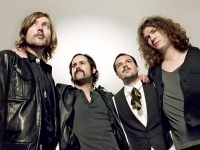
The Killers are an American rock band from Las Vegas, Nevada. Formed in 2002, the group consists of Brandon Flowers (vocals, keyboards), Dave Keuning (guitar, vocals), Mark Stoermer (bass guitar, vocals) and Ronnie Vannucci Jr., (percussion, drums) with Ray Suen often providing support during live performances.
Part of the post-punk revival movement, The Killers draw influence from music styles of the 1980s and 1990s. The group's debut album, Hot Fuss (2004) brought the band mainstream success. The Killers' second album, Sam's Town, was released in 2006, and the compilation album Sawdustk containing B-sides, rarities, and new material, was released in 2007. The band's first two albums have sold in excess of 12 million copies worldwide combined. The group is currently working on their third album, entitled Day and Age, which is being produced by Stuart Price.
Part of the post-punk revival movement, The Killers draw influence from music styles of the 1980s and 1990s. The group's debut album, Hot Fuss (2004) brought the band mainstream success. The Killers' second album, Sam's Town, was released in 2006, and the compilation album Sawdustk containing B-sides, rarities, and new material, was released in 2007. The band's first two albums have sold in excess of 12 million copies worldwide combined. The group is currently working on their third album, entitled Day and Age, which is being produced by Stuart Price.
Arthur Foote
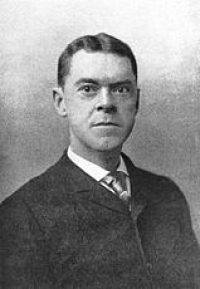
Arthur William Foote (5 March 1853 in Salem, Massachusetts – 8 April 1937 in Boston, Massachusetts) was an American classical composer, and a member of the "Boston Six." The other five were George Whitefield Chadwick, Amy Beach, Edward MacDowell, John Knowles Paine, and Horatio Parker.
Howl's Moving Castle
Sophie (Emily Mortimer) has an uneventful life at her late father's hat shop, but all that changes when she befriends wizard Howl (Christian Bale), who lives in a magical flying castle. However, the evil Witch of Waste (Lauren Bacall) takes issue with their budding relationship and casts a spell on …
Paganini

Niccolò Paganini (27 October 1782 – 27 May 1840) was an Italian violinist, violist, guitarist, and composer. He was one of the most celebrated violin virtuosi of his time, and left his mark as one of the pillars of modern violin technique. His caprice in A minor, Op. 1 No. 24 is among his best known of compositions, and serves as inspiration for many prominent artists.
Paganini composed his own works to play exclusively in his concerts, all of which had profound influences on the evolution of violin techniques. His 24 Caprices were probably composed in the period between 1805 to 1809, while he was in the service of the Baciocchi court. Also during this period, he composed the majority of the solo pieces, duo-sonatas,trios and quartets for the guitar. These chamber works may have been inspired by the publication, in Lucca, of the guitar quintets of Boccherini. Many of his variations (and he has become the de facto master of this musical genre), including Le Streghe, The Carnival of Venice, and Nel cor più non mi sento, were composed, or at least first performed, before his European concert tour.
Playbill of Paganini's concert at the Covent Garden in 1832. Note that all solo pieces were of his composition, which was typical of all his concerts.
Generally speaking, Paganini's compositions were technically imaginative, and the timbre of the instrument was greatly expanded as a result of these works. Sounds of different musical instruments and animals were often imitated. One such composition was titled Il Fandango Spanolo (The Spanish Dance), which featured a series of humorous imitations of farm animals. Even more outrageous was a solo piece Duetto Amoroso, in which the sighs and groans of lovers were intimately depicted on the violin. Fortunately there survives a manuscript of the Duetto which has been recorded, while the existence of the Fandango is known only through concert posters.
However, his works were criticized for lacking characteristics of true polyphonism, as pointed out by Eugène Ysaÿe. Yehudi Menuhin, on the other hand, suggested that this might have been the result of his reliance on the guitar (in lieu of the piano) as an aid in composition. The orchestral parts for his concertos were often polite, unadventurous, and clearly supportive of the soloist. In this, his style is consistent with that of other Italian composers such as Paisiello, Rossini and Donizetti, who were influenced by the guitar-song milieu of Naples during this period.
Paganini was also the inspiration of many prominent composers. Both "La Campanella" and the A minor caprice (Nr. 24) have been an object of interest for a number of composers. Franz Liszt, Johannes Brahms, Sergei Rachmaninoff, Boris Blacher, Andrew Lloyd Webber, George Rochberg and Witold Lutosławski, among others, wrote well-known variations on these themes.
Paganini composed his own works to play exclusively in his concerts, all of which had profound influences on the evolution of violin techniques. His 24 Caprices were probably composed in the period between 1805 to 1809, while he was in the service of the Baciocchi court. Also during this period, he composed the majority of the solo pieces, duo-sonatas,trios and quartets for the guitar. These chamber works may have been inspired by the publication, in Lucca, of the guitar quintets of Boccherini. Many of his variations (and he has become the de facto master of this musical genre), including Le Streghe, The Carnival of Venice, and Nel cor più non mi sento, were composed, or at least first performed, before his European concert tour.
Playbill of Paganini's concert at the Covent Garden in 1832. Note that all solo pieces were of his composition, which was typical of all his concerts.
Generally speaking, Paganini's compositions were technically imaginative, and the timbre of the instrument was greatly expanded as a result of these works. Sounds of different musical instruments and animals were often imitated. One such composition was titled Il Fandango Spanolo (The Spanish Dance), which featured a series of humorous imitations of farm animals. Even more outrageous was a solo piece Duetto Amoroso, in which the sighs and groans of lovers were intimately depicted on the violin. Fortunately there survives a manuscript of the Duetto which has been recorded, while the existence of the Fandango is known only through concert posters.
However, his works were criticized for lacking characteristics of true polyphonism, as pointed out by Eugène Ysaÿe. Yehudi Menuhin, on the other hand, suggested that this might have been the result of his reliance on the guitar (in lieu of the piano) as an aid in composition. The orchestral parts for his concertos were often polite, unadventurous, and clearly supportive of the soloist. In this, his style is consistent with that of other Italian composers such as Paisiello, Rossini and Donizetti, who were influenced by the guitar-song milieu of Naples during this period.
Paganini was also the inspiration of many prominent composers. Both "La Campanella" and the A minor caprice (Nr. 24) have been an object of interest for a number of composers. Franz Liszt, Johannes Brahms, Sergei Rachmaninoff, Boris Blacher, Andrew Lloyd Webber, George Rochberg and Witold Lutosławski, among others, wrote well-known variations on these themes.
Michel Legrand
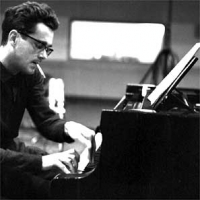
Michel Jean Legrand (born February 24, 1932, in Bécon-les-Bruyères in the Paris suburbs) is a French musical composer, arranger, conductor, and pianist. His father Raymond Legrand was a conductor and composer renowned for hits such as Irma la douce and his mother, Marcelle Der Mikaëlian (sister of conductor Jacques Hélian), who married Legrand in 1929, was descended from the Armenian bourgeoisie..
Legrand has composed more than two hundred film and television scores and several musicals and has made well over a hundred albums. He has won three Oscars (out of 13 nominations) and five Grammys and has been nominated for an Emmy. He was twenty-two when his first album, I Love Paris, became one of the best-selling instrumental albums ever released. He is a virtuoso jazz and classical pianist and an accomplished arranger and conductor who performs with orchestras all over the world.
He studied music at the Paris Conservatoire from 1943-50 (ages 11–20), working with, among others, Nadia Boulanger, who also taught many other composers including Aaron Copland and Philip Glass. Legrand graduated with top honors as both a composer and a pianist.
Legrand has composed more than two hundred film and television scores and several musicals and has made well over a hundred albums. He has won three Oscars (out of 13 nominations) and five Grammys and has been nominated for an Emmy. He was twenty-two when his first album, I Love Paris, became one of the best-selling instrumental albums ever released. He is a virtuoso jazz and classical pianist and an accomplished arranger and conductor who performs with orchestras all over the world.
He studied music at the Paris Conservatoire from 1943-50 (ages 11–20), working with, among others, Nadia Boulanger, who also taught many other composers including Aaron Copland and Philip Glass. Legrand graduated with top honors as both a composer and a pianist.
Donald Ray Payne
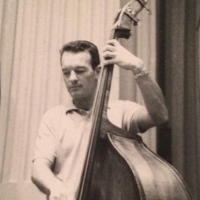
Donald Ray Payne January 7, 1933, Wellington, Texas – February 25, 2017, Plantation, Florida) was an American jazz double-bassist and electric bassist.Payne was raised in California and first played trumpet before switching to double bass in high school. His first major gigs occurred in the mid-1950s; he worked in the second half of the decade with Georgie Auld, Ornette Coleman, Maynard Ferguson, Calvin Jackson, Joe Maini, and Art Pepper. In 1958 he relocated to New York City, where he played with Tony Bennett, Chris Connor, and Mundell Lowe, then joined Herbie Mann and Astrud Gilberto for international tours. He also worked with Stan Getz around this time. He led his own ensemble with a rotating cast of sidemen, including Mike Abene, Joe Beck, and Gene Bertoncini.
Sally DeFord

Sally DeFord Musical artist Born: 1959 (age 60 years), Eugene, Oregon, United States
Record labels: Defordmusic, Defordmusic.com, Sally DeFord Music, Sally DeFord
Genres: Alt Contemporary Christian, Christian/Gospel
Albums: He Is My Song, MORE
Record labels: Defordmusic, Defordmusic.com, Sally DeFord Music, Sally DeFord
Genres: Alt Contemporary Christian, Christian/Gospel
Albums: He Is My Song, MORE
Toshiro Masuda
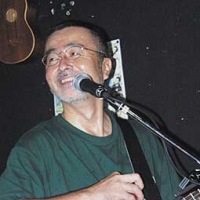
Toshio Masuda (舛田 利雄 Masuda Toshio?, born October 5, 1927 in Kobe, Hyōgo, Japan) is a Japanese film director. He developed a reputation as a consistent box office hit-maker. Over the course of five decades, 16 of his films made the yearly top ten lists at the Japanese box office—a second place record in the industry. Between 1958 and 1968 he directed 52 films for the Nikkatsu Company. He was their top director of action films and worked with the company's top stars, including Yujiro Ishihara with whom he made 25 films. After the breakdown of the studio system, he moved on to a succession of big-budget movies including the American-Japanese co-production Tora! Tora! Tora! (1970) and the science fiction epic Catastrophe 1999: The Prophecies of Nostradamus (1974). He worked on such anime productions as the Space Battleship Yamato series. His corporate drama Company Funeral (1989) earned him a Japanese Academy Award nomination and wins at the Blue Ribbon Awards and Mainichi Film Awards. In Japan, his films are well remembered by fans and called genre landmarks by critics. He remains little known abroad save for rare exceptions of his post-Nikkatsu work such as Tora! Tora! Tora!. However, a number of his films were screened in a 2005 Nikkatsu Action Cinema retrospective in Italy and a few have since made their way to the United States. At the age of 81, he is currently prepping to helm Space Battleship Yamato: Rebirth (2009).
Halo

Halo is an American military science fiction media franchise managed and developed by 343 Industries and published by Xbox Game Studios. The franchise and its early main installments were originally developed by Bungie. The central focus of the franchise builds off the experiences of Master Chief John-117, one of a group of supersoldiers codenamed Spartans, and his artificial intelligence (AI) companion, Cortana.
Jeffrey Harrington
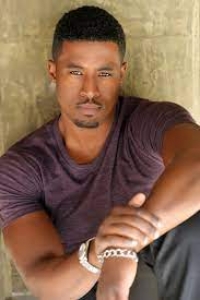
A noted microtonalist and electronic experimentalist, he was also one of the first musicians to adopt the Internet for music distribution and promoting,
Phillip Landgrave
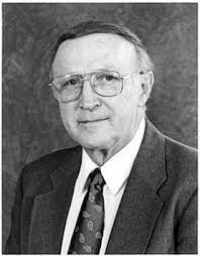
Phillip Landgrave Dr. Landgrave comes from a musical family. He began to play and compose at an early age. His published and/or publicly performed works now include over 500 anthems, hymns and solos; 10 cantatas, 3 oratorios, 5 music dramas, 4 Christian musicals, 2 choral series and choral collections in Spanish, Portuguese, and Russian.
Billie Holiday
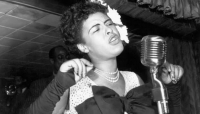
Billie Holiday, American singer, songwriter, composer. Nicknamed "Lady Day", Billie Holiday is the daughter of a traveling musician father. His childhood, deprived of education, included a poor life. She was raped at the age of 11 and was given boarding at a Catholic school.
roy turk
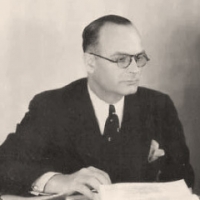
Roy Kenneth Turk was an American songwriter and lyricist, he frequently collaborated with composer Fred E. Ahlert – their popular 1929 song "Mean to Me" has become a jazz standard. He worked with many other composers, including for film lyrics. Turk was elected to the Songwriters Hall of Fame in 1970.
Antonin Dvorak

Antonín Leopold Dvořák (English pronunciation: /ˈdvɒrʒɑːk/ DVOR-zhahk or /ˈdvɒrʒæk/ DVOR-zhak; Czech: ( listen); September 8, 1841 – May 1, 1904) was a Czech composer of Romantic music, who employed the idioms of the folk music of Moravia and his native Bohemia. His works include operas, symphonic, choral and chamber music. His best-known works include his New World Symphony, the Slavonic Dances, "American" String Quartet, and Cello Concerto in B minor.
Dvořák wrote in a variety of forms: his nine symphonies generally stick to classical models that Beethoven would have recognised, but he also worked in the newly developed symphonic poem form and the influence of Richard Wagner is apparent in some works. Many of his works also show the influence of Czech folk music, both in terms of rhythms and melodic shapes; perhaps the best known examples are the two sets of Slavonic Dances. Dvořák also wrote operas (of which the best known is Rusalka); serenades for string orchestra and wind ensemble; chamber music (including a number of string quartets, and quintets); songs; choral music; and piano music.
Dvořák wrote in a variety of forms: his nine symphonies generally stick to classical models that Beethoven would have recognised, but he also worked in the newly developed symphonic poem form and the influence of Richard Wagner is apparent in some works. Many of his works also show the influence of Czech folk music, both in terms of rhythms and melodic shapes; perhaps the best known examples are the two sets of Slavonic Dances. Dvořák also wrote operas (of which the best known is Rusalka); serenades for string orchestra and wind ensemble; chamber music (including a number of string quartets, and quintets); songs; choral music; and piano music.
 Sheet Music Network is a site for those who wants to access popular sheet music easily,
letting them download the sheet music for free for trial purposes.
It's completely free to download and try the listed sheet music, but you have to delete the files after 24 hours of trial.
Don't forget, if you like the piece of music you have just learned playing,
treat the artist with respect, and go buy the original sheet music.
Sheet Music Network is a site for those who wants to access popular sheet music easily,
letting them download the sheet music for free for trial purposes.
It's completely free to download and try the listed sheet music, but you have to delete the files after 24 hours of trial.
Don't forget, if you like the piece of music you have just learned playing,
treat the artist with respect, and go buy the original sheet music.
